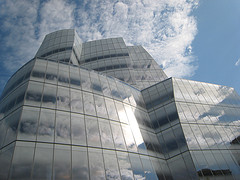
Gadgetoff 2007 was our most remarkable event to
date. The terrific venues spanned New York, New Jersey and the harbor: the IAC building, Liberty State
Park, and the fabulously renovated Liberty Science Center. There were great gadgets,
astounding inventions, terrific presentations, and a fabulous gadget bag. But, without a doubt,
the best part of the event was the joyous sense of community and fun… if our friends just
conversed with each other the whole day, Gadgetoff would have still been a success.
Trying to list the highlights of the Gadgetoff is difficult when you have 300 active participants.
So, we'll start at the beginning. Barry Diller and his team at the IAC were kind enough
to let us tour the remarkable Frank Gehry designed building on the lower West Side of
Manhattan. Since a large number of our creative Gadgetoff colleagues helped create the world’s
largest interactive display screen, the highlight of the IAC
building was the delightful tour of the
capabilities of the enormous video wall. Our
friends Jakob Trollback, Jeff Han, Eli
Kuslansky, Steve Zink and other long-time Gadgetoff
friends contributed to this miracle.
 We marched, 350
strong, across the West Side Highway to an awaiting ferry where, for the second year, we
risked touring the Hudson River. This year, however, the Lack-o’-Rain Gods smiled upon us,
and as we noshed on coffee and Danish, our ferry passengers discovered that we were being stalked
by a magnificent white 200 foot dirigible that escorted us into the dock at Liberty State Park.
We marched, 350
strong, across the West Side Highway to an awaiting ferry where, for the second year, we
risked touring the Hudson River. This year, however, the Lack-o’-Rain Gods smiled upon us,
and as we noshed on coffee and Danish, our ferry passengers discovered that we were being stalked
by a magnificent white 200 foot dirigible that escorted us into the dock at Liberty State Park.
There two enormous hot air balloons greeted us including one shaped like the Space Shuttle. They floated
right in the shadow of the Statue of Liberty and Ellis Island. As we entered the restored
Central Terminal, Gadgetoff 2007 began in earnest!
Inside, rows of train tracks, overgrown with weeds, remained as a reminder of millions of immigrants who
fanned out across the country from this “point of decision.” It was fitting that we would
return with the latest technology at the starting gate for the scientists, engineers,
laborers, and inventors that transformed America a century ago into the greatest technological
superpower on Earth.
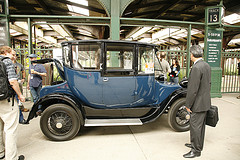 Inside
the station, a host of fabulous vehicles: from a
fully-functioning 1914 electric car to several
BMW hydrogen-powered cars.
Bottles of water with the words “Exhaust” were distributed to celebrate the engineering miracle of the BMW
hydrogen cars. Plus, we popped the hood on the new high-performance Lexus Hybrid, parked next
to the stunning solar-powered vehicle built by and driven by high school students across the
country. Video Ray not only shared their amazing video-camera laden submersible again but
finally allowed us to board Scott Bentley’s high-tech customized bus tricked-out to
perfection.
Inside
the station, a host of fabulous vehicles: from a
fully-functioning 1914 electric car to several
BMW hydrogen-powered cars.
Bottles of water with the words “Exhaust” were distributed to celebrate the engineering miracle of the BMW
hydrogen cars. Plus, we popped the hood on the new high-performance Lexus Hybrid, parked next
to the stunning solar-powered vehicle built by and driven by high school students across the
country. Video Ray not only shared their amazing video-camera laden submersible again but
finally allowed us to board Scott Bentley’s high-tech customized bus tricked-out to
perfection.
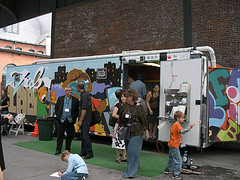 Many were blown-away by the collaborative workshop on
wheels created by MIT and Sustainable South Bronx. This portable Fab-Lab,
first announced in concept form at last year’s Gadgetoff, now was actually whirring, grinding,
with laser-cutters cooking away. Gaily painted and magnetic to the many kids attending, the
portable Fab-Lab was staffed by spirited Bronx students and volunteers who proved how inspired
people become when they manufacture their own toys and devices.
Many were blown-away by the collaborative workshop on
wheels created by MIT and Sustainable South Bronx. This portable Fab-Lab,
first announced in concept form at last year’s Gadgetoff, now was actually whirring, grinding,
with laser-cutters cooking away. Gaily painted and magnetic to the many kids attending, the
portable Fab-Lab was staffed by spirited Bronx students and volunteers who proved how inspired
people become when they manufacture their own toys and devices.
There was similar high-energy on the other side of the train terminal, where an entire playing field of
robots skirmished to demo the latest FIRST Robotics competition. Teen roboticists were
thrilled when long-time Gadgetoff friends, inventor Dean Kamen, FIRST Founder, and John
Abele, FIRST Chairman, made a surprise appearance.
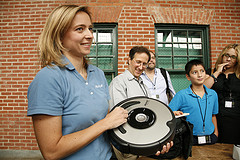 But there were more robots of course: iRobot premiered two new
consumer products and gave us an exclusive hands-on demonstration. The fast-tracked
rain-gutter cleaning robot and a sophisticated home surveillance robot were revealed. But how
can we forget iRobot’s latest Roomba? Smaller, faster, and quieter, this home vacuum cleaning
robot has been completely redesigned and the results are revolutionary. Even though millions
of earlier units are still cleaning rooms out there, the new Roomba works wonderfully.
But there were more robots of course: iRobot premiered two new
consumer products and gave us an exclusive hands-on demonstration. The fast-tracked
rain-gutter cleaning robot and a sophisticated home surveillance robot were revealed. But how
can we forget iRobot’s latest Roomba? Smaller, faster, and quieter, this home vacuum cleaning
robot has been completely redesigned and the results are revolutionary. Even though millions
of earlier units are still cleaning rooms out there, the new Roomba works wonderfully.
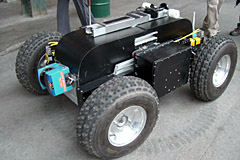 Carnegie Mellon, which last year brought its amazing DARPA
Challenge vehicle, this time showed off a robust life-saving robot that securely navigates and
inspects dangerous underground mines. (Later, Red Whittaker of CMU, explained this robot’s
capabilities.
Carnegie Mellon, which last year brought its amazing DARPA
Challenge vehicle, this time showed off a robust life-saving robot that securely navigates and
inspects dangerous underground mines. (Later, Red Whittaker of CMU, explained this robot’s
capabilities.
Historians, standing at various stations near the tracks,
described how Liberty State Park was reclaimed
after once being a site inundated by toxic
waste; others described how America’s rich
technological culture was created by the
immigrants who passed through this station. One
of the most bizarre and remarkable stories told
about the site was on the “Black Tom”
disaster. Saboteurs, in the First World War
caused a tremendous explosion of a nearby
munitions dump, causing millions of dollars of
damage (including to the Statue of Liberty.)
Author Chad Millman described the mysteries
behind the “Black Tom” affair which still ranks
among the worst terrorist incidents in American
history.
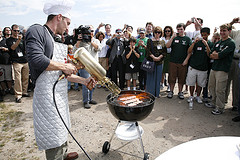 Despite being surrounded by amazing technology and history,
many participants were just happy to schmooze, eat lunch, and catch up on new projects. But,
everyone soon moved outside as Neal Ormond cooked a spectacular BBQ using his custom-made
flamethrower. Under the dubious eye of some rather unhappy officials, many lucky Gadgetoff
connoisseurs tried Ormond’s astonishing banana flambé or flamethrower beef, both of which were
delicious.
Despite being surrounded by amazing technology and history,
many participants were just happy to schmooze, eat lunch, and catch up on new projects. But,
everyone soon moved outside as Neal Ormond cooked a spectacular BBQ using his custom-made
flamethrower. Under the dubious eye of some rather unhappy officials, many lucky Gadgetoff
connoisseurs tried Ormond’s astonishing banana flambé or flamethrower beef, both of which were
delicious.
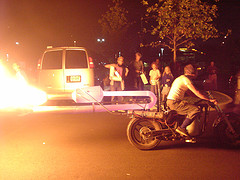 Some lucky friends got to ride around on an “ultimate terrain
vehicle,” the Tom Car, which even a grandma could drive straight up and down the mountain.
Of course there was high drama as the Madagascar Group almost had to abort the launch of their
rocket-powered motorcycle until they were saved by a maintenance crew member of Liberty State
Park who found another leaf blower needed to get
the raucous motorcycle started. When the jet rocket bike finally roared to life and lurched
precariously through the park, the Gadgetoff crowd went wild.
Some lucky friends got to ride around on an “ultimate terrain
vehicle,” the Tom Car, which even a grandma could drive straight up and down the mountain.
Of course there was high drama as the Madagascar Group almost had to abort the launch of their
rocket-powered motorcycle until they were saved by a maintenance crew member of Liberty State
Park who found another leaf blower needed to get
the raucous motorcycle started. When the jet rocket bike finally roared to life and lurched
precariously through the park, the Gadgetoff crowd went wild.
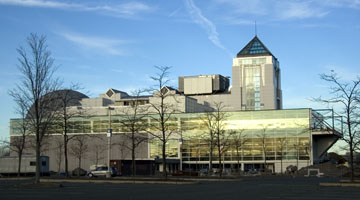 Next
stop, right up the cobblestone road from the old CRRNJ
rail station, was the newly renovated Liberty
Science Center. Long before the
public opening in July, while the two-year
massive reconstruction was still underway, Wayne
LaBar, LSC Director of Exhibits, took us to
marvel at the $160 million rebuilding effort at
the construction site. Wayne, a longtime
Gadgetoff participant, knew the LSC would be a
perfect venue for Gadgetoff 2007, and our
gracious host proved to be absolutely right.
Next
stop, right up the cobblestone road from the old CRRNJ
rail station, was the newly renovated Liberty
Science Center. Long before the
public opening in July, while the two-year
massive reconstruction was still underway, Wayne
LaBar, LSC Director of Exhibits, took us to
marvel at the $160 million rebuilding effort at
the construction site. Wayne, a longtime
Gadgetoff participant, knew the LSC would be a
perfect venue for Gadgetoff 2007, and our
gracious host proved to be absolutely right.
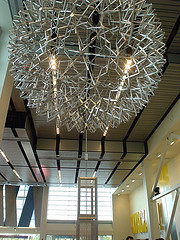 Though the paint was still wet on some of the
walls and several exhibits remained under
construction, participants took whirlwind
gallery tours with designers of this massively
reconfigured technology palace. Innovative
exhibits, using state-of-the-art multimedia and
tactile displays, focused on diverse themes as
Skyscrapers, Communication History, Infection,
and Islamic influences on science.
Though the paint was still wet on some of the
walls and several exhibits remained under
construction, participants took whirlwind
gallery tours with designers of this massively
reconfigured technology palace. Innovative
exhibits, using state-of-the-art multimedia and
tactile displays, focused on diverse themes as
Skyscrapers, Communication History, Infection,
and Islamic influences on science.
While most of our participants were touring the
new museum, others were franticly putting
finishing touches on their gadget presentations
on tables in the central gallery. Here a
massive area was curtained off to display
literally hundreds of items of gadgetry,
robotics, electronic art, science project demos,
electronic music, optical illusions, astronomy
tools, etc. There were hysterical scenes as
the efficient museum security guards struggled
to adapt to a bizarre parade of massive
four-wheeled robots, customized Segways, and
mad scientists running through the front doors
with bags and boxes full of bizarre and somewhat
threatening-looking electronic gadgetry.
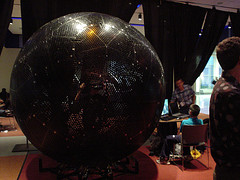 While the gadget setup was happening upstairs,
downstairs many of us gathered to gaze in awe at
Liberty Science Center’s 10-foot high earth
projection sphere.
Numerous astonishing data sets and
visualizations of the changing earth and natural
phenomenon were illuminated in hyper-realistic
fashion. Many of us shared Dean Kamen’s
sentiment as he watched this massive globe
display and said, “I need this in my house!”
(The difference is that we know Dean will
get one, even if he has to construct a better
one himself.)
While the gadget setup was happening upstairs,
downstairs many of us gathered to gaze in awe at
Liberty Science Center’s 10-foot high earth
projection sphere.
Numerous astonishing data sets and
visualizations of the changing earth and natural
phenomenon were illuminated in hyper-realistic
fashion. Many of us shared Dean Kamen’s
sentiment as he watched this massive globe
display and said, “I need this in my house!”
(The difference is that we know Dean will
get one, even if he has to construct a better
one himself.)
So many of the great designers involved in the
remaking of Liberty Science Center have long
histories participating in Gadgetoff’s past and
present. It was wonderful to see new Chuck
Hoberman designs while his iconic massive
sphere--- extended and contracted in the
museum’s entrance--- beckoned all who wished to
share in the explosion of innovation.
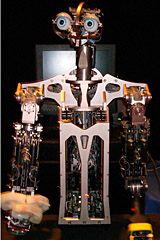 The Liberty Science Center auditorium
became
the stage for Gadgetoff. Artist Leni Schwendinger
choreographed the stage illumination; our
friends from Color Kinetics brought innovative
lighting including the staggering infinite color
LED hanging drapes; Bruce Gitlin of Milgo-Bufkin
and friends fabricated and delivered a massive
steel honey-combed centerpiece designed
specifically for this Gadgetoff. But they were
not alone: dozens of other Gadgetoff
participants volunteered their artistry and
talent in all aspects of the production here in
the auditorium and at the many other venues
during the day. Even Jakob Trollback, brilliant
director and animator, whipped up an terrific
opening animation… made even more extraordinary
once we got the sound to work!
The Liberty Science Center auditorium
became
the stage for Gadgetoff. Artist Leni Schwendinger
choreographed the stage illumination; our
friends from Color Kinetics brought innovative
lighting including the staggering infinite color
LED hanging drapes; Bruce Gitlin of Milgo-Bufkin
and friends fabricated and delivered a massive
steel honey-combed centerpiece designed
specifically for this Gadgetoff. But they were
not alone: dozens of other Gadgetoff
participants volunteered their artistry and
talent in all aspects of the production here in
the auditorium and at the many other venues
during the day. Even Jakob Trollback, brilliant
director and animator, whipped up an terrific
opening animation… made even more extraordinary
once we got the sound to work!
It is impossible to summarize all the
presentations during the two speaker sessions.
We won’t even try. Instead,
here’s where you can
enjoy the full videos. Gadgetoff presentations
come in two varieties: short and shorter. The
ideal presentation never exceeds three minutes
and most of the best speeches came during the
one-minute “speed rounds” where our friends get
up, share something wonderful, then sit down.
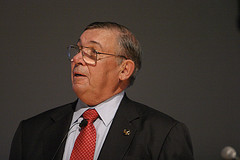 Dr. Tony Tether, director of DARPA, keynoted the
first session and described many of their
scientific breakthroughs (including the new
effort for high-tech robotic limb replacements,
examples of which were on display in the Gadget
zone.) There were presentations on
mind-controlled robots; latest studies on brain
function; demos of a camera that could track a
laser in flight and another that captures
emissions and disruptions in the atmosphere.
Peter Menzel took us on his gastronomical
exploration of edible insects and other
obsessions and Dr. Yossi Vardi delivered an
extensive investigation into the lesser-known
problem of “local-cooling” (and we’re talking
about gonads, here, ladies and gentlemen.)
Dr. Tony Tether, director of DARPA, keynoted the
first session and described many of their
scientific breakthroughs (including the new
effort for high-tech robotic limb replacements,
examples of which were on display in the Gadget
zone.) There were presentations on
mind-controlled robots; latest studies on brain
function; demos of a camera that could track a
laser in flight and another that captures
emissions and disruptions in the atmosphere.
Peter Menzel took us on his gastronomical
exploration of edible insects and other
obsessions and Dr. Yossi Vardi delivered an
extensive investigation into the lesser-known
problem of “local-cooling” (and we’re talking
about gonads, here, ladies and gentlemen.)
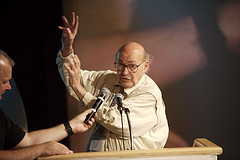 Red Whittaker updates us about the autonomous
Urban Challenge competition and on the
astonishing robot to save lives in underground
mines. Juan Enriquez discussed breakthroughs in
bio-engineering while Rick Smolan explored the
nuances in how families relate. Aaron Edsinger’s
robot demonstrated the difficulty of
replicating human behaviors ; Team Sabuda
displayed their remarkable methods of
fabricating their astounding pop-up book design
methods; more robots (now cleaning gutters and
taking care of the house-bound); more interfaces
allowing new two-handed control; new 3D home
fabrication devices; and more and more. Under
Secretary Cohen, head of Science and Technology
for the Department
Red Whittaker updates us about the autonomous
Urban Challenge competition and on the
astonishing robot to save lives in underground
mines. Juan Enriquez discussed breakthroughs in
bio-engineering while Rick Smolan explored the
nuances in how families relate. Aaron Edsinger’s
robot demonstrated the difficulty of
replicating human behaviors ; Team Sabuda
displayed their remarkable methods of
fabricating their astounding pop-up book design
methods; more robots (now cleaning gutters and
taking care of the house-bound); more interfaces
allowing new two-handed control; new 3D home
fabrication devices; and more and more. Under
Secretary Cohen, head of Science and Technology
for the Department
 of Homeland Security
unveiled and triggered the “Dazzler,” a
non-lethal weapon designed to nauseate
assailants. (Worked for me J)
of Homeland Security
unveiled and triggered the “Dazzler,” a
non-lethal weapon designed to nauseate
assailants. (Worked for me J)
“My Brain Hurts!” Panelists, in rapid fire,
relentless created new synapses in our brains.
There was an hysterical (but potentially
lucrative) description of a science project to
train crows to recover lost coins and a
mind-blowing taste experiment, in which Barb
Stuckey proved taste is not a tongue-thing but a
nose-thing. With that, we exploded out of the
theater and to dinner and the gadget displays.
 Sony
showed off a 4K projector - it was the best
image quality any of us had ever seen. You
could stand next to a full-size cinema screen
and strain to see the pixels.
Sony
showed off a 4K projector - it was the best
image quality any of us had ever seen. You
could stand next to a full-size cinema screen
and strain to see the pixels.
Our friends at
IMAX premiered their totally immersive, new Transformers movie
at the Liberty Science Center's IMAX theater.
The movie literaly blew the room away.
Into the Gadget Zone
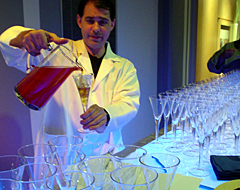 I was told the food was delicious. Who had time?
But Mattson Foods premiered two new
color-changing specialty cocktails introduced at
Gadgetoff. I enjoyed “Red to Blue” drink but
wimped out on the other one. (You didn’t just
need to show ID before getting these alcoholic
drinks, you also had to sign a legal release!)
I was told the food was delicious. Who had time?
But Mattson Foods premiered two new
color-changing specialty cocktails introduced at
Gadgetoff. I enjoyed “Red to Blue” drink but
wimped out on the other one. (You didn’t just
need to show ID before getting these alcoholic
drinks, you also had to sign a legal release!)
In addition to the robotic limbs, a half-million
dollar robotic head, a life-size sculpture made
of Lego, there were literally hundreds of other
object d’brain-hurt on display. Everyone
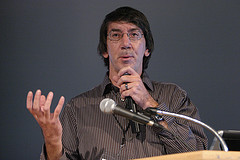 found
their own highlights: mine included the
life-size mesh orb that allowed full running
movement for video simulation; the hemispheric
planetarium with a database of celestial objects
exceeding that held by the Hayden Planetarium;
full demos of Will Wright’s kick-butt world
creation engine game, “Spore”; and musical
robots and guerrilla-tech art from Madagascar
Institute.
found
their own highlights: mine included the
life-size mesh orb that allowed full running
movement for video simulation; the hemispheric
planetarium with a database of celestial objects
exceeding that held by the Hayden Planetarium;
full demos of Will Wright’s kick-butt world
creation engine game, “Spore”; and musical
robots and guerrilla-tech art from Madagascar
Institute.
Several huge multi-touch display technologies
were on hand while puffy indoor blimps elegantly
maneuvered around the gorgeous gallery.
Educational Innovations had a captivating table
crammed with the hundreds of samples of
scientific toys and experiments. Wheeled robots,
balancing robots, tracked robots, autonomous
robots, and a large self-balancing 4-wheeled
Centaur (from Segway) intermingled
harmoniously.
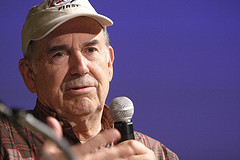 John Abele keynoted the second session of talks
with the moving and triumphant tale of his
search for the WWII submarine that sunk with his
father and crew. (You really must watch this
astonishing account.) The range of speakers was
astonishing: Cosmologist Dr. Paul Steinhardt,
the Albert Einstein Professor of Physics at
Princeton, presented not one but two plausible
scenarios of what transpired in the first five
minutes of the formation of the Universe (and
did so, miraculously, with breathtaking clarity
in under five minutes.) Will Wright, who has
created his own virtual universe first with “The
Sims” now introduced us to his latest work on
his new game of creation, “Spore.”
John Abele keynoted the second session of talks
with the moving and triumphant tale of his
search for the WWII submarine that sunk with his
father and crew. (You really must watch this
astonishing account.) The range of speakers was
astonishing: Cosmologist Dr. Paul Steinhardt,
the Albert Einstein Professor of Physics at
Princeton, presented not one but two plausible
scenarios of what transpired in the first five
minutes of the formation of the Universe (and
did so, miraculously, with breathtaking clarity
in under five minutes.) Will Wright, who has
created his own virtual universe first with “The
Sims” now introduced us to his latest work on
his new game of creation, “Spore.”
 Aubrey de Gray inspired us about the path to
longevity. Dr. Joy Hirsch showed us her
research on how thoughts can be mapped in the
human brain and took us on a visual tour of Dan
Dubno’s frenetic brain via a Functional MRI
display. Martin Eberhard’s presentation
revealing automobile crash testing was, um, a
big hit. Sandy Pentland spoke poignantly about
the search for technologies to enhance life on
earth others (including the newly-minted
“MacArthur Genius” grant winner Saul Griffith)
lovingly described fun hacks and neat tech
projects certain to inspire new generations of
innovators. Michael Winter had us all giddy and
wanting to sign-up for the pioneering
playfulness of the “Stupid Fun Club.”
Aubrey de Gray inspired us about the path to
longevity. Dr. Joy Hirsch showed us her
research on how thoughts can be mapped in the
human brain and took us on a visual tour of Dan
Dubno’s frenetic brain via a Functional MRI
display. Martin Eberhard’s presentation
revealing automobile crash testing was, um, a
big hit. Sandy Pentland spoke poignantly about
the search for technologies to enhance life on
earth others (including the newly-minted
“MacArthur Genius” grant winner Saul Griffith)
lovingly described fun hacks and neat tech
projects certain to inspire new generations of
innovators. Michael Winter had us all giddy and
wanting to sign-up for the pioneering
playfulness of the “Stupid Fun Club.”
Graffiti Research Lab's James Powderly and Evan Roth
concluded the presentation with their outdoor
display of "L.A.S.E.R. Tag"… a portable
computer vision and projector system that allows
protestors to make non-destructive but powerful
social comment via large electronic graffiti
displays. Using a simple green laser, the
graffiti artist writes his message on a wall and
the machine copies and displays it vividly.
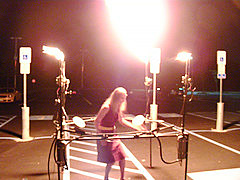 As folks from the Madagascar Institute lit
up Flaming Simon, a huge series of flaming jets
seared the sky in rhythmic play. And they once
more propelled the rocket jet bike, now blasting
and blazing in the evening darkness, a roaring
conclusion to the Gadgetoff festivities at the
Liberty Science Center.
As folks from the Madagascar Institute lit
up Flaming Simon, a huge series of flaming jets
seared the sky in rhythmic play. And they once
more propelled the rocket jet bike, now blasting
and blazing in the evening darkness, a roaring
conclusion to the Gadgetoff festivities at the
Liberty Science Center.
Steve Jobs would say, “Oh, and Just One More
thing” and that is exactly what we did -
participants left with an insane GadgetBag
(actually two bags and a Wowwee Toys
 Dragonfly.) Books, gadgets, pranks,
experiments, t-shirts, and other insanity
weighed down the crowd as we headed with joy to
the Ferry waiting to take us back to Manhattan.
Dragonfly.) Books, gadgets, pranks,
experiments, t-shirts, and other insanity
weighed down the crowd as we headed with joy to
the Ferry waiting to take us back to Manhattan.
As we stood there, on the Ferry, in the clear
night, gazing at the lights and small boats in
the harbor, behind us, over the Statue of
Liberty the dark sky erupted in a display of
fireworks. A perfect ending to a perfect day.



 Gadgetoff 2007 was our most remarkable event to
date. The terrific venues spanned New York, New Jersey and the harbor: the IAC building, Liberty State
Park, and the fabulously renovated Liberty Science Center. There were great gadgets,
astounding inventions, terrific presentations, and a fabulous gadget bag. But, without a doubt,
the best part of the event was the joyous sense of community and fun… if our friends just
conversed with each other the whole day, Gadgetoff would have still been a success.
Gadgetoff 2007 was our most remarkable event to
date. The terrific venues spanned New York, New Jersey and the harbor: the IAC building, Liberty State
Park, and the fabulously renovated Liberty Science Center. There were great gadgets,
astounding inventions, terrific presentations, and a fabulous gadget bag. But, without a doubt,
the best part of the event was the joyous sense of community and fun… if our friends just
conversed with each other the whole day, Gadgetoff would have still been a success.
 We marched, 350
strong, across the West Side Highway to an awaiting ferry where, for the second year, we
risked touring the Hudson River. This year, however, the Lack-o’-Rain Gods smiled upon us,
and as we noshed on coffee and Danish, our ferry passengers discovered that we were being stalked
by a magnificent white 200 foot dirigible that escorted us into the dock at Liberty State Park.
We marched, 350
strong, across the West Side Highway to an awaiting ferry where, for the second year, we
risked touring the Hudson River. This year, however, the Lack-o’-Rain Gods smiled upon us,
and as we noshed on coffee and Danish, our ferry passengers discovered that we were being stalked
by a magnificent white 200 foot dirigible that escorted us into the dock at Liberty State Park. Inside
the station, a host of fabulous vehicles: from a
fully-functioning 1914 electric car to several
BMW hydrogen-powered cars.
Bottles of water with the words “Exhaust” were distributed to celebrate the engineering miracle of the BMW
hydrogen cars. Plus, we popped the hood on the new high-performance Lexus Hybrid, parked next
to the stunning solar-powered vehicle built by and driven by high school students across the
country. Video Ray not only shared their amazing video-camera laden submersible again but
finally allowed us to board Scott Bentley’s high-tech customized bus tricked-out to
perfection.
Inside
the station, a host of fabulous vehicles: from a
fully-functioning 1914 electric car to several
BMW hydrogen-powered cars.
Bottles of water with the words “Exhaust” were distributed to celebrate the engineering miracle of the BMW
hydrogen cars. Plus, we popped the hood on the new high-performance Lexus Hybrid, parked next
to the stunning solar-powered vehicle built by and driven by high school students across the
country. Video Ray not only shared their amazing video-camera laden submersible again but
finally allowed us to board Scott Bentley’s high-tech customized bus tricked-out to
perfection. Many were blown-away by the collaborative workshop on
wheels created by MIT and Sustainable South Bronx. This portable Fab-Lab,
first announced in concept form at last year’s Gadgetoff, now was actually whirring, grinding,
with laser-cutters cooking away. Gaily painted and magnetic to the many kids attending, the
portable Fab-Lab was staffed by spirited Bronx students and volunteers who proved how inspired
people become when they manufacture their own toys and devices.
Many were blown-away by the collaborative workshop on
wheels created by MIT and Sustainable South Bronx. This portable Fab-Lab,
first announced in concept form at last year’s Gadgetoff, now was actually whirring, grinding,
with laser-cutters cooking away. Gaily painted and magnetic to the many kids attending, the
portable Fab-Lab was staffed by spirited Bronx students and volunteers who proved how inspired
people become when they manufacture their own toys and devices. But there were more robots of course: iRobot premiered two new
consumer products and gave us an exclusive hands-on demonstration. The fast-tracked
rain-gutter cleaning robot and a sophisticated home surveillance robot were revealed. But how
can we forget iRobot’s latest Roomba? Smaller, faster, and quieter, this home vacuum cleaning
robot has been completely redesigned and the results are revolutionary. Even though millions
of earlier units are still cleaning rooms out there, the new Roomba works wonderfully.
But there were more robots of course: iRobot premiered two new
consumer products and gave us an exclusive hands-on demonstration. The fast-tracked
rain-gutter cleaning robot and a sophisticated home surveillance robot were revealed. But how
can we forget iRobot’s latest Roomba? Smaller, faster, and quieter, this home vacuum cleaning
robot has been completely redesigned and the results are revolutionary. Even though millions
of earlier units are still cleaning rooms out there, the new Roomba works wonderfully.
 Carnegie Mellon, which last year brought its amazing DARPA
Challenge vehicle, this time showed off a robust life-saving robot that securely navigates and
inspects dangerous underground mines. (Later, Red Whittaker of CMU, explained this robot’s
capabilities.
Carnegie Mellon, which last year brought its amazing DARPA
Challenge vehicle, this time showed off a robust life-saving robot that securely navigates and
inspects dangerous underground mines. (Later, Red Whittaker of CMU, explained this robot’s
capabilities. Despite being surrounded by amazing technology and history,
many participants were just happy to schmooze, eat lunch, and catch up on new projects. But,
everyone soon moved outside as Neal Ormond cooked a spectacular BBQ using his custom-made
flamethrower. Under the dubious eye of some rather unhappy officials, many lucky Gadgetoff
connoisseurs tried Ormond’s astonishing banana flambé or flamethrower beef, both of which were
delicious.
Despite being surrounded by amazing technology and history,
many participants were just happy to schmooze, eat lunch, and catch up on new projects. But,
everyone soon moved outside as Neal Ormond cooked a spectacular BBQ using his custom-made
flamethrower. Under the dubious eye of some rather unhappy officials, many lucky Gadgetoff
connoisseurs tried Ormond’s astonishing banana flambé or flamethrower beef, both of which were
delicious. Some lucky friends got to ride around on an “ultimate terrain
vehicle,” the Tom Car, which even a grandma could drive straight up and down the mountain.
Of course there was high drama as the Madagascar Group almost had to abort the launch of their
rocket-powered motorcycle until they were saved by a maintenance crew member of Liberty State
Park who found another leaf blower needed to get
the raucous motorcycle started. When the jet rocket bike finally roared to life and lurched
precariously through the park, the Gadgetoff crowd went wild.
Some lucky friends got to ride around on an “ultimate terrain
vehicle,” the Tom Car, which even a grandma could drive straight up and down the mountain.
Of course there was high drama as the Madagascar Group almost had to abort the launch of their
rocket-powered motorcycle until they were saved by a maintenance crew member of Liberty State
Park who found another leaf blower needed to get
the raucous motorcycle started. When the jet rocket bike finally roared to life and lurched
precariously through the park, the Gadgetoff crowd went wild. Next
stop, right up the cobblestone road from the old CRRNJ
rail station, was the newly renovated Liberty
Science Center. Long before the
public opening in July, while the two-year
massive reconstruction was still underway, Wayne
LaBar, LSC Director of Exhibits, took us to
marvel at the $160 million rebuilding effort at
the construction site. Wayne, a longtime
Gadgetoff participant, knew the LSC would be a
perfect venue for Gadgetoff 2007, and our
gracious host proved to be absolutely right.
Next
stop, right up the cobblestone road from the old CRRNJ
rail station, was the newly renovated Liberty
Science Center. Long before the
public opening in July, while the two-year
massive reconstruction was still underway, Wayne
LaBar, LSC Director of Exhibits, took us to
marvel at the $160 million rebuilding effort at
the construction site. Wayne, a longtime
Gadgetoff participant, knew the LSC would be a
perfect venue for Gadgetoff 2007, and our
gracious host proved to be absolutely right. Though the paint was still wet on some of the
walls and several exhibits remained under
construction, participants took whirlwind
gallery tours with designers of this massively
reconfigured technology palace. Innovative
exhibits, using state-of-the-art multimedia and
tactile displays, focused on diverse themes as
Skyscrapers, Communication History, Infection,
and Islamic influences on science.
Though the paint was still wet on some of the
walls and several exhibits remained under
construction, participants took whirlwind
gallery tours with designers of this massively
reconfigured technology palace. Innovative
exhibits, using state-of-the-art multimedia and
tactile displays, focused on diverse themes as
Skyscrapers, Communication History, Infection,
and Islamic influences on science.  While the gadget setup was happening upstairs,
downstairs many of us gathered to gaze in awe at
Liberty Science Center’s 10-foot high earth
projection sphere.
Numerous astonishing data sets and
visualizations of the changing earth and natural
phenomenon were illuminated in hyper-realistic
fashion. Many of us shared Dean Kamen’s
sentiment as he watched this massive globe
display and said, “I need this in my house!”
(The difference is that we know Dean will
get one, even if he has to construct a better
one himself.)
While the gadget setup was happening upstairs,
downstairs many of us gathered to gaze in awe at
Liberty Science Center’s 10-foot high earth
projection sphere.
Numerous astonishing data sets and
visualizations of the changing earth and natural
phenomenon were illuminated in hyper-realistic
fashion. Many of us shared Dean Kamen’s
sentiment as he watched this massive globe
display and said, “I need this in my house!”
(The difference is that we know Dean will
get one, even if he has to construct a better
one himself.)  The Liberty Science Center auditorium
became
the stage for Gadgetoff. Artist Leni Schwendinger
choreographed the stage illumination; our
friends from Color Kinetics brought innovative
lighting including the staggering infinite color
LED hanging drapes; Bruce Gitlin of Milgo-Bufkin
and friends fabricated and delivered a massive
steel honey-combed centerpiece designed
specifically for this Gadgetoff. But they were
not alone: dozens of other Gadgetoff
participants volunteered their artistry and
talent in all aspects of the production here in
the auditorium and at the many other venues
during the day. Even Jakob Trollback, brilliant
director and animator, whipped up an terrific
opening animation… made even more extraordinary
once we got the sound to work!
The Liberty Science Center auditorium
became
the stage for Gadgetoff. Artist Leni Schwendinger
choreographed the stage illumination; our
friends from Color Kinetics brought innovative
lighting including the staggering infinite color
LED hanging drapes; Bruce Gitlin of Milgo-Bufkin
and friends fabricated and delivered a massive
steel honey-combed centerpiece designed
specifically for this Gadgetoff. But they were
not alone: dozens of other Gadgetoff
participants volunteered their artistry and
talent in all aspects of the production here in
the auditorium and at the many other venues
during the day. Even Jakob Trollback, brilliant
director and animator, whipped up an terrific
opening animation… made even more extraordinary
once we got the sound to work!  Dr. Tony Tether, director of DARPA, keynoted the
first session and described many of their
scientific breakthroughs (including the new
effort for high-tech robotic limb replacements,
examples of which were on display in the Gadget
zone.) There were presentations on
mind-controlled robots; latest studies on brain
function; demos of a camera that could track a
laser in flight and another that captures
emissions and disruptions in the atmosphere.
Peter Menzel took us on his gastronomical
exploration of edible insects and other
obsessions and Dr. Yossi Vardi delivered an
extensive investigation into the lesser-known
problem of “local-cooling” (and we’re talking
about gonads, here, ladies and gentlemen.)
Dr. Tony Tether, director of DARPA, keynoted the
first session and described many of their
scientific breakthroughs (including the new
effort for high-tech robotic limb replacements,
examples of which were on display in the Gadget
zone.) There were presentations on
mind-controlled robots; latest studies on brain
function; demos of a camera that could track a
laser in flight and another that captures
emissions and disruptions in the atmosphere.
Peter Menzel took us on his gastronomical
exploration of edible insects and other
obsessions and Dr. Yossi Vardi delivered an
extensive investigation into the lesser-known
problem of “local-cooling” (and we’re talking
about gonads, here, ladies and gentlemen.)  Red Whittaker updates us about the autonomous
Urban Challenge competition and on the
astonishing robot to save lives in underground
mines. Juan Enriquez discussed breakthroughs in
bio-engineering while Rick Smolan explored the
nuances in how families relate. Aaron Edsinger’s
robot demonstrated the difficulty of
replicating human behaviors ; Team Sabuda
displayed their remarkable methods of
fabricating their astounding pop-up book design
methods; more robots (now cleaning gutters and
taking care of the house-bound); more interfaces
allowing new two-handed control; new 3D home
fabrication devices; and more and more. Under
Secretary Cohen, head of Science and Technology
for the Department
Red Whittaker updates us about the autonomous
Urban Challenge competition and on the
astonishing robot to save lives in underground
mines. Juan Enriquez discussed breakthroughs in
bio-engineering while Rick Smolan explored the
nuances in how families relate. Aaron Edsinger’s
robot demonstrated the difficulty of
replicating human behaviors ; Team Sabuda
displayed their remarkable methods of
fabricating their astounding pop-up book design
methods; more robots (now cleaning gutters and
taking care of the house-bound); more interfaces
allowing new two-handed control; new 3D home
fabrication devices; and more and more. Under
Secretary Cohen, head of Science and Technology
for the Department
 of Homeland Security
unveiled and triggered the “Dazzler,” a
non-lethal weapon designed to nauseate
assailants. (Worked for me J)
of Homeland Security
unveiled and triggered the “Dazzler,” a
non-lethal weapon designed to nauseate
assailants. (Worked for me J)  Sony
showed off a 4K projector - it was the best
image quality any of us had ever seen. You
could stand next to a full-size cinema screen
and strain to see the pixels.
Sony
showed off a 4K projector - it was the best
image quality any of us had ever seen. You
could stand next to a full-size cinema screen
and strain to see the pixels. I was told the food was delicious. Who had time?
But Mattson Foods premiered two new
color-changing specialty cocktails introduced at
Gadgetoff. I enjoyed “Red to Blue” drink but
wimped out on the other one. (You didn’t just
need to show ID before getting these alcoholic
drinks, you also had to sign a legal release!)
I was told the food was delicious. Who had time?
But Mattson Foods premiered two new
color-changing specialty cocktails introduced at
Gadgetoff. I enjoyed “Red to Blue” drink but
wimped out on the other one. (You didn’t just
need to show ID before getting these alcoholic
drinks, you also had to sign a legal release!)
 found
their own highlights: mine included the
life-size mesh orb that allowed full running
movement for video simulation; the hemispheric
planetarium with a database of celestial objects
exceeding that held by the Hayden Planetarium;
full demos of Will Wright’s kick-butt world
creation engine game, “Spore”; and musical
robots and guerrilla-tech art from Madagascar
Institute.
found
their own highlights: mine included the
life-size mesh orb that allowed full running
movement for video simulation; the hemispheric
planetarium with a database of celestial objects
exceeding that held by the Hayden Planetarium;
full demos of Will Wright’s kick-butt world
creation engine game, “Spore”; and musical
robots and guerrilla-tech art from Madagascar
Institute.  John Abele keynoted the second session of talks
with the moving and triumphant tale of his
search for the WWII submarine that sunk with his
father and crew. (You really must watch this
astonishing account.) The range of speakers was
astonishing: Cosmologist Dr. Paul Steinhardt,
the Albert Einstein Professor of Physics at
Princeton, presented not one but two plausible
scenarios of what transpired in the first five
minutes of the formation of the Universe (and
did so, miraculously, with breathtaking clarity
in under five minutes.) Will Wright, who has
created his own virtual universe first with “The
Sims” now introduced us to his latest work on
his new game of creation, “Spore.”
John Abele keynoted the second session of talks
with the moving and triumphant tale of his
search for the WWII submarine that sunk with his
father and crew. (You really must watch this
astonishing account.) The range of speakers was
astonishing: Cosmologist Dr. Paul Steinhardt,
the Albert Einstein Professor of Physics at
Princeton, presented not one but two plausible
scenarios of what transpired in the first five
minutes of the formation of the Universe (and
did so, miraculously, with breathtaking clarity
in under five minutes.) Will Wright, who has
created his own virtual universe first with “The
Sims” now introduced us to his latest work on
his new game of creation, “Spore.”  Aubrey de Gray inspired us about the path to
longevity. Dr. Joy Hirsch showed us her
research on how thoughts can be mapped in the
human brain and took us on a visual tour of Dan
Dubno’s frenetic brain via a Functional MRI
display. Martin Eberhard’s presentation
revealing automobile crash testing was, um, a
big hit. Sandy Pentland spoke poignantly about
the search for technologies to enhance life on
earth others (including the newly-minted
“MacArthur Genius” grant winner Saul Griffith)
lovingly described fun hacks and neat tech
projects certain to inspire new generations of
innovators. Michael Winter had us all giddy and
wanting to sign-up for the pioneering
playfulness of the “Stupid Fun Club.”
Aubrey de Gray inspired us about the path to
longevity. Dr. Joy Hirsch showed us her
research on how thoughts can be mapped in the
human brain and took us on a visual tour of Dan
Dubno’s frenetic brain via a Functional MRI
display. Martin Eberhard’s presentation
revealing automobile crash testing was, um, a
big hit. Sandy Pentland spoke poignantly about
the search for technologies to enhance life on
earth others (including the newly-minted
“MacArthur Genius” grant winner Saul Griffith)
lovingly described fun hacks and neat tech
projects certain to inspire new generations of
innovators. Michael Winter had us all giddy and
wanting to sign-up for the pioneering
playfulness of the “Stupid Fun Club.” As folks from the Madagascar Institute lit
up Flaming Simon, a huge series of flaming jets
seared the sky in rhythmic play. And they once
more propelled the rocket jet bike, now blasting
and blazing in the evening darkness, a roaring
conclusion to the Gadgetoff festivities at the
Liberty Science Center.
As folks from the Madagascar Institute lit
up Flaming Simon, a huge series of flaming jets
seared the sky in rhythmic play. And they once
more propelled the rocket jet bike, now blasting
and blazing in the evening darkness, a roaring
conclusion to the Gadgetoff festivities at the
Liberty Science Center.  Dragonfly.) Books, gadgets, pranks,
experiments, t-shirts, and other insanity
weighed down the crowd as we headed with joy to
the Ferry waiting to take us back to Manhattan.
Dragonfly.) Books, gadgets, pranks,
experiments, t-shirts, and other insanity
weighed down the crowd as we headed with joy to
the Ferry waiting to take us back to Manhattan.